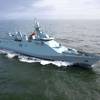Thailand’s navy has approved a 36 billion baht ($1.1 billion) plan to buy three submarines from China, reports local media. Royal Thai navy officials selected China over competing bids from Russia, Sweden, France, Germany and South Korea.
Leading members of the ruling military junta and the Royal Thai Navy have insisted that a plan to buy three submarines from China is necessary to augment Thailand’s national defense capabilities.
Although Thailand’s navy has maintained a submarine division, it has lacked a single vessel for the last 63 years. The army stripped the navy of its submarines in 1951 after naval officers attempted to stage a coup d’etat against the army-backed government at the time.
Thailand’s social media has been awash with criticism of the new plan to purchase submarines, with commentators noting the enormous price tag, and questioning whether submarines are indeed vital to Thailand’s strategic needs, as the country is not entangled in any major conflict with neighbors, and has not been invaded by sea since 1941.
Criticism of the deal has been strong in Bangkok’s media, with some skeptics saying it would waste money because Thailand has no enemies and the military previously bought an unimpressive aircraft carrier and blimp, plus fake bomb detectors.
Prime Minister Prayut Chan-o-cha said that the plan to buy three submarines had nothing to do with the move to strengthen ties with China.
Prayut said the proposal was the result of the Navy's vision for the next decade. He urged critics not to link the submarine purchase proposal with the fishing measures, the train projects or other plans initiated by the government.
Protection of trade routes and territorial disputes are just some of the things the navy has to think about in planning maritime strategies and missions, he said. "If we don't buy submarines, don't we need to protect those routes?" Gen Prayut asked reporters, appearing irritated about growing doubts over the sub purchase plan.
Officials say Thailand’s quest for submarines makes strategic sense and could help it ensure freedom of navigation in the Gulf of Thailand if territorial disputes in the South China Sea spiral out of control.













